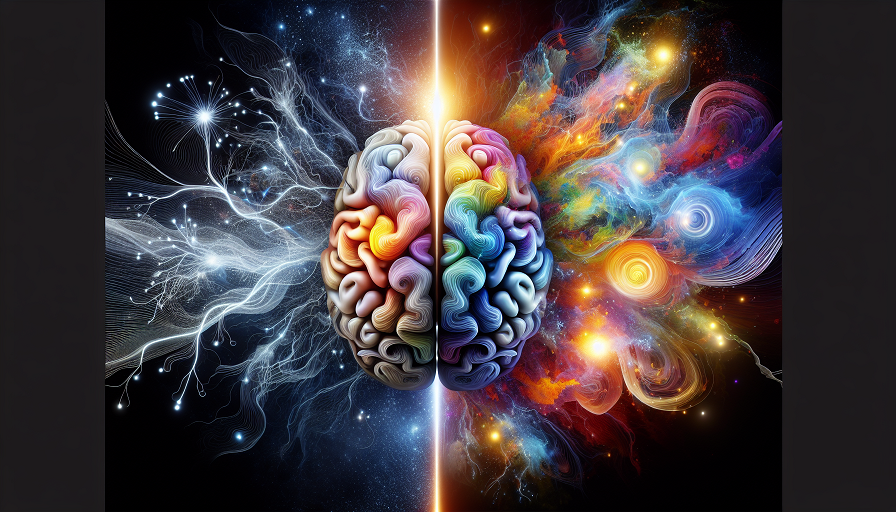
Creativity is a fascinating aspect of human intelligence that often leaves us wondering: are some people just born with it, or can it be developed over time? This intriguing debate around whether creativity is more of a skill, something you can nurture and grow, or a trait, something that is inherent and static, has been explored by researchers for years. Here we look into what the research says and how various factors, including brain supplements, might play a role in enhancing our creative abilities.
Contents
The Nature vs. Nurture Debate
If we look back in history, creativity has always been revered as a mysterious and somewhat elusive quality. Some people seem to be brimming with original ideas while others need to work at it more. This brings us to the classic nature vs. nurture debate—are some people naturally more creative, or can anyone become creative given the right circumstances and effort?
Research suggests that creativity involves a complex interplay of both genetic and environmental factors. Studies have indicated that there are certain genetic markers that may predispose individuals to creative thinking. Yet, the environment one is exposed to—encouragement to think outside the box, access to broad experiences, or a supportive community—also nurtures creative thought. Thus, creativity is not just a fixed trait, but rather, like a muscle, it can be honed and strengthened over time.
Creativity as a Skill
When thinking of creativity as a skill, the focus shifts towards practice, learning, and regular engagement with creative processes. Just as with any skill, the more you practice creativity, the better you will become at it. An artist refining their style, a writer experimenting with new genres, or a scientist thinking up innovative experiments each display creativity being treated as a skill.
Research in psychology has demonstrated that engaging in activities that challenge your brain, like learning a new language or playing an instrument, can enhance creative abilities. Similar to how physical exercise conditions the body, mental exercises can condition the brain, thus improving creativity. Skills such as brainstorming, problem-solving, and lateral thinking are all parts of the creativity toolbox and can be cultivated with practice and dedication.
Creativity as a Trait
On the flip side, viewing creativity as a trait implies that some people are naturally more inclined towards inventive and original thinking due to their genetic makeup. Studies involving twins have shown that there is a genetic component to creativity, meaning that some people might be more biologically predisposed to thinking creatively.
Personality traits often associated with creative individuals include openness to experience, curiosity, and a willingness to take risks. These traits can potentially be more innate and differ from person to person regardless of external influences. However, having these traits does not guarantee creative expression if the environment does not support or encourage the realization of one’s potential.
Exploring Brain Supplements and Creativity
In recent years, there’s been growing interest in exploring how brain supplements, or nootropics, might impact creativity. These supplements often contain ingredients that are thought to enhance cognitive functions such as memory, focus, and even creative thinking. Popular nootropic substances like caffeine, ginkgo biloba, or omega-3 fatty acids are frequently discussed in the context of boosting brainpower.
While the science is still emerging, some studies suggest that certain nootropics could indeed foster a creative mindset by improving brain function and connectivity. For example, caffeine is known to enhance alertness, which might lead to more productive creative brainstorming sessions. However, the effects can vary greatly from person to person, and it’s crucial to approach these supplements with an understanding of their limitations and the potential placebo effect. Always consult a healthcare professional before starting any supplement regimen.
Practical Ways to Boost Creativity
Whether you consider yourself a natural creative or someone who develops creativity through practice, there are plenty of strategies you can employ to boost your creative capacity. These techniques often involve stepping out of your comfort zone and embracing new experiences and challenges.
- Diverse Experiences: Seek out experiences that break your routine. Travel, take up a new hobby, or engage with a different culture.
- Mindfulness: Practice mindfulness techniques like meditation to clear the mind and foster a space where creative ideas can flow freely.
- Collaboration: Work with others who have different perspectives. Collaborative projects can ignite fresh ideas and inspire innovative solutions.
- Journaling: Keep a creative journal to capture spontaneous thoughts and ideas. Revisiting these entries can spark further inspiration.
The Future of Creativity Research
As scientific research continues to unravel the mysteries of creativity, a deeper understanding of how it functions, and how we can enhance it, is likely. Advances in neurology and psychology may eventually help determine more definitively whether creativity is a trait, a skill, or perhaps a nuanced blend of both.
The journey to understanding creativity is as complex and imaginative as the subject itself. Regardless of whether it’s seen as a skill or a trait, fostering creativity remains a valuable pursuit that enriches lives, fuels innovation, and propels human progress forward.

